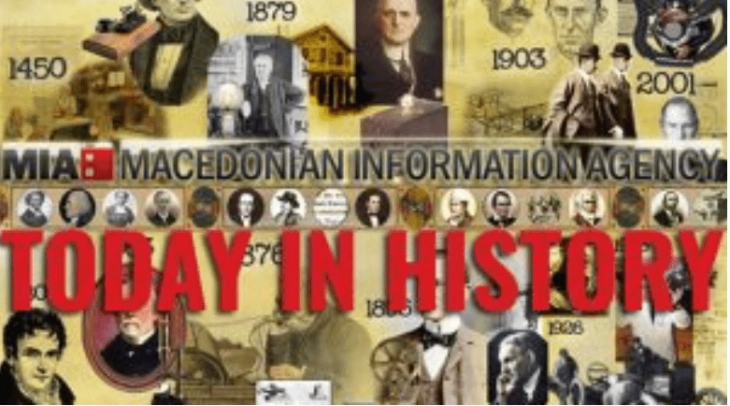
23 June 2024 (MIA)
1305 – A peace treaty between the Flemish and the French is signed at Athis-sur-Orge.
1314 – First War of Scottish Independence: The Battle of Bannockburn (south of Stirling) begins.
1532 – Henry VIII of England and Francis I of France sign a secret treaty against Emperor Charles V, Holy Roman Emperor.
1565 – Dragut, commander of the Ottoman navy, dies during the Great Siege of Malta.
1611 – The mutinous crew of Henry Hudson’s fourth voyage sets Henry, his son and seven loyal crew members adrift in an open boat in what is now Hudson Bay; they are never heard from again.
1661 – Marriage contract between Charles II of England and Catherine of Braganza.
1683 – William Penn signs a friendship treaty with Lenni Lenape Indians in Pennsylvania.
1713 – The French residents of Acadia are given one year to declare allegiance to Britain or leave Nova Scotia, Canada.
1757 – Battle of Plassey: Three thousand British troops under Robert Clive defeat a 50,000-strong Indian army under Siraj ud-Daulah at Plassey.
1758 – Seven Years’ War: Battle of Krefeld: British forces defeat French troops at Krefeld in Germany.
1760 – Seven Years’ War: Battle of Landeshut: Austria defeats Prussia.
1780 – American Revolution: Battle of Springfield fought in and around Springfield, New Jersey (including Short Hills, formerly of Springfield, now of Millburn Township).
1794 – Empress Catherine II of Russia grants Jews permission to settle in Kyiv.
1810 – John Jacob Astor forms the Pacific Fur Company.
1812 – War of 1812: Great Britain revokes the restrictions on American commerce, thus eliminating one of the chief reasons for going to war.
1848 – Beginning of the June Days Uprising in Paris, France.
1860 – The United States Congress establishes the Government Printing Office.
1865 – American Civil War: At Fort Towson in the Oklahoma Territory, Confederate, Brigadier General Stand Watie surrenders the last significant rebel army.
1868 – Typewriter: Christopher Latham Sholes received a patent for an invention he called the “Type-Writer.”
1894 – The International Olympic Committee is founded at the Sorbonne in Paris, at the initiative of Baron Pierre de Coubertin.
1913 – Second Balkan War: The Greeks defeat the Bulgarians in the Battle of Doiran.
1914 – Mexican Revolution: Pancho Villa takes Zacatecas from Victoriano Huerta.
1917 – In a game against the Washington Senators, Boston Red Sox pitcher Ernie Shore retires 26 batters in a row after replacing Babe Ruth, who had been ejected for punching the umpire.
1919 – Estonian War of Independence: The decisive defeat of the Baltische Landeswehr in the Battle of Cēsis. This day is celebrated as Victory Day in Estonia.
1938 – The Civil Aeronautics Act is signed into law, forming the Civil Aeronautics Authority in the United States.
1940 – Adolf Hitler goes on a three-hour tour of the architecture of Paris with architect Albert Speer and sculptor Arno Breker in his only visit to the city.
1941 – The Lithuanian Activist Front declares independence from the Soviet Union and forms the Provisional Government of Lithuania; it lasts only briefly as the Nazis will occupy Lithuania a few weeks later.
1942 – World War II: The first selections for the gas chamber at Auschwitz take place on a train full of Jews from Paris.
1942 – World War II: Germany’s latest fighter aircraft, a Focke-Wulf Fw 190, is captured intact when it mistakenly lands at RAF Pembrey in Wales.
1943 – World War II: The British destroyers HMS Eclipse and HMS Laforey sink the Italian submarine Ascianghi in the Mediterranean after she torpedoes the cruiser HMS Newfoundland.
1946 – The 1946 Vancouver Island earthquake strikes Vancouver Island, British Columbia, Canada.
1946 – The National Democratic Front wins a landslide victory in the municipal elections in French India.
1947 – The United States Senate follows the United States House of Representatives in overriding U.S. President Harry Truman’s veto of the Taft–Hartley Act.
1956 – The French National Assembly takes the first step in creating the French Community by passing the Loi Cadre, transferring a number of powers from Paris to elected territorial governments in French West Africa.
1958 – The Dutch Reformed Church accepts women ministers.
1959 – Convicted Manhattan Project spy Klaus Fuchs is released after only nine years in prison and allowed to emigrate to Dresden, East Germany where he resumes a scientific career.
1959 – A fire in a resort hotel in Stalheim (Norway) kills 34 people.
1960 – The United States Food and Drug Administration declares Enovid to be the first officially approved combined oral contraceptive pill in the world.
1961 – Cold War: The Antarctic Treaty, which sets aside Antarctica as a scientific preserve and bans military activity on the continent, comes into force after the opening date for signature set for the December 1, 1959.
1967 – Cold War: U.S. President Lyndon B. Johnson meets with Soviet Premier Alexei Kosygin in Glassboro, New Jersey for the three-day Glassboro Summit Conference.
1969 – Warren E. Burger is sworn in as Chief Justice of the United States Supreme Court by retiring Chief Justice Earl Warren.
1969 – IBM announces that effective January 1970 it will price its software and services separately from hardware thus creating the modern software industry.
1972 – Watergate scandal: U.S. President Richard M. Nixon and White House Chief of Staff H. R. Haldeman are taped talking about using the Central Intelligence Agency to obstruct the Federal Bureau of Investigation’s investigation into the Watergate break-ins.
1972 – Title IX of the United States Civil Rights Act of 1964 is amended to prohibit sexual discrimination to any educational program receiving federal funds.
1973 – A fire at a house in Hull, England which kills a six-year-old boy is passed off as an accident; it later emerges as the first of 26 deaths by fire caused over the next seven years by arsonist Peter Dinsdale.
1982 – Chinese American Vincent Chin dies in a coma after being beaten in Highland Park, Michigan on June 19, by two auto workers who had mistaken him for Japanese and who were angry about the success of Japanese auto companies.
1985 – A terrorist bomb aboard Air India Flight 182 brings the Boeing 747 down off the coast of Ireland killing all 329 aboard.
1999 – The first edition of the daily newspaper ‘Utrinski Vesnik’ is published. It closed in May 2017.
2001 – Three police officers were killed in a shootout with Albanian guerrilla gunmen.
2001 – The 8.4 Mw southern Peru earthquake shakes coastal Peru with a maximum Mercalli intensity of VIII (Severe). A destructive tsunami followed, leaving at least 74 people dead, and 2,687 injured.
2013 – Nik Wallenda becomes the first man to successfully walk across the Grand Canyon on a tight rope.
2013 – About 16 militants stormed a high-altitude mountaineering base camp near Nanga Parbat in Gilgit–Baltistan, Pakistan and killed ten climbers, as well as a local guide.
2014 – The last of Syria’s declared chemical weapons are shipped out for destruction.
2016 – Brexit: The EU referendum and the Brexit referendum, took place on 23 June 2016 in the United Kingdom (UK) and Gibraltar to ask the electorate if the country should remain a member of, or leave the European Union (EU), under the provisions of the European Union Referendum Act 2015 and also the Political Parties, Elections and Referendums Act 2000. The referendum resulted in 51.9% of votes being in favour of leaving the EU.







